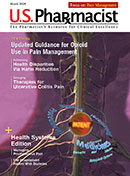For months, pharmacies have reported shortages of hydroxychloroquine, putting patients with lupus and rheumatoid arthritis in a bind. Supplies should rebound shortly on the heels of news that the FDA has revoked the emergency-use authorization for both hydroxychloroquine and chloroquine. This was done after an analysis determined that the drugs are unlikely to be effective in treating COVID-19 and “in light of ongoing serious cardiac adverse events and other potential serious side effects” that outweigh any potential benefits of the drugs.
A large recent study among patients hospitalized with COVID-19 found no benefit from the drugs for mortality or time to recovery. Other studies have demonstrated that the recommended dosages of hydroxychloroquine and chloroquine “are unlikely to kill or inhibit the virus that causes COVID-19,” the FDA said.
Some patients may have stockpiled the drugs “just in case” they developed symptoms of COVID-19 or tested positive for the SARS-CoV-2 virus that causes the disease, based on stories in social media and other outlets that said the malaria drugs could cure COVID-19. Others may not have heard about the new data and may want to fill prescriptions for the drugs.
While since April the FDA has warned against the use of the drugs outside of a hospital setting, on June 15 the agency issued an announcement that should make people thinking of using them to prevent or treat the novel coronavirus stop in their tracks.
“FDA is warning health care providers that co-administration of remdesivir and chloroquine phosphate or hydroxychloroquine sulfate is not recommended as it may result in reduced antiviral activity of remdesivir,” the FDA said. Remdesivir was granted emergency-use authorization for COVID-19 in May.
The FDA issued a fact sheet with the warning that an in vitro study in which the drugs were coadministered demonstrated a dose-dependent “antagonistic effect of chloroquine on the intracellular metabolic activation and antiviral activity of remdesivir.” Higher concentrations of chloroquine also reduced the amount of remdesivir in normal human bronchial epithelial cells, the FDA said.
The warning of potential drug interaction is particularly important because studies have demonstrated that treatment with remdesivir significantly reduces patients’ time to recovery. That means that the likely ineffective and potentially dangerous quinolines could reduce the effectiveness of a drug that is known to help patients hospitalized with COVID-19, making for a very poor trade-off.
If you have patients who have been taking hydroxychloroquine or chloroquine who test positive for COVID-19 or exhibit symptoms, encourage them to discontinue the drug and alert their healthcare provider. If other patients ask about taking a quinoline “just in case,” you can tell them that these drugs are not a viable safety measure. And for those patients that have been worried about getting their regularly prescribed hydroxychloroquine for lupus or rheumatoid arthritis, you can share the good news that availability should soon be back to normal.
The content contained in this article is for informational purposes only. The content is not intended to be a substitute for professional advice. Reliance on any information provided in this article is solely at your own risk.





